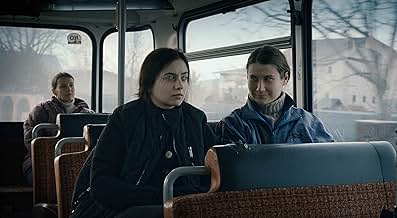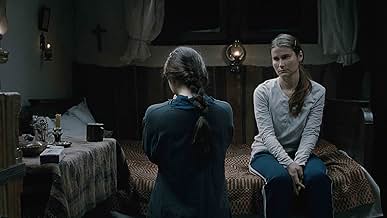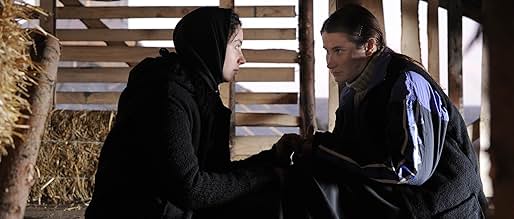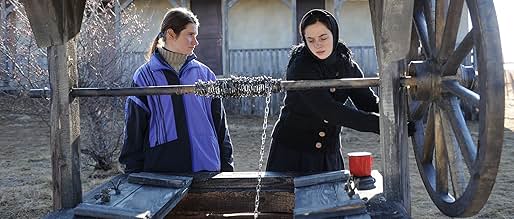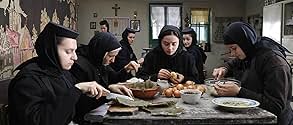CALIFICACIÓN DE IMDb
7.5/10
14 k
TU CALIFICACIÓN
Una amistad entre dos jóvenes que crecieron en el mismo orfanato; una se ha refugiado en un convento de Rumania y se niega a irse con su amiga, que ahora vive en Alemania.Una amistad entre dos jóvenes que crecieron en el mismo orfanato; una se ha refugiado en un convento de Rumania y se niega a irse con su amiga, que ahora vive en Alemania.Una amistad entre dos jóvenes que crecieron en el mismo orfanato; una se ha refugiado en un convento de Rumania y se niega a irse con su amiga, que ahora vive en Alemania.
- Dirección
- Guionistas
- Elenco
- Premios
- 8 premios ganados y 19 nominaciones en total
Valeriu Andriuta
- Priest
- (as Valeriu Andriutã)
- Dirección
- Guionistas
- Todo el elenco y el equipo
- Producción, taquilla y más en IMDbPro
Opiniones destacadas
A girl visits a convent to try and bring her friend home.
Starring Cosmina Stratan and Cristina Flutur.
Written by Cristian Mungiu. Inspired by the Non Fiction Novels of Tatiana Niculescu Bran.
Directed by Cristian Mungiu.
This is a dark and disturbing movie that would have been far better if it wasn't so slow paced.
It moves at a snails pace but maybe that's what Cristian Mungiu intended, after all I'm guessing that's how things flow in a convent. The story isn't bad and as far as I could tell ( this was a Romanian movie with English subtitles) the acting was okay without being incredible.
I liked the outside location cinematography but the indoor stuff looked a bit wobbly. This is an arty film and usually I like anything like this but for me this was too slow and bordering on boring. For me it lacked something but I'm not sure what. Maybe the relationship between the two main characters could have been explored more to make this more watchable? We only get a few suggestions of a love affair in the past between them both and so perhaps that's what this movie needed.
It does make you think. It's pretty much an anti religious movie and that's the message that came across clearly at the end.
7/10
Starring Cosmina Stratan and Cristina Flutur.
Written by Cristian Mungiu. Inspired by the Non Fiction Novels of Tatiana Niculescu Bran.
Directed by Cristian Mungiu.
This is a dark and disturbing movie that would have been far better if it wasn't so slow paced.
It moves at a snails pace but maybe that's what Cristian Mungiu intended, after all I'm guessing that's how things flow in a convent. The story isn't bad and as far as I could tell ( this was a Romanian movie with English subtitles) the acting was okay without being incredible.
I liked the outside location cinematography but the indoor stuff looked a bit wobbly. This is an arty film and usually I like anything like this but for me this was too slow and bordering on boring. For me it lacked something but I'm not sure what. Maybe the relationship between the two main characters could have been explored more to make this more watchable? We only get a few suggestions of a love affair in the past between them both and so perhaps that's what this movie needed.
It does make you think. It's pretty much an anti religious movie and that's the message that came across clearly at the end.
7/10
A complex story plot describing a tragic division of life paths of two female friends who found themselves either into grinding mill of bigotry in church structures or into that of a cold bureaucratic apparatus. This poetically told story leads us through meditative winter landscapes and dark interiors of the monastery where, besides obvious social issues, one can vaguely discern a disturbing relationship between the two friends consisting of perplexing resignation and self-destruction. The success of this work lies in the abundance of details which bring the audience into contemplation about human nature.
The Romanian film Dupa Dealuri (2012) was shown in the U.S. with the title "Beyond the Hills." The movie was written and directed by Cristian Mungiu.
A better name for this film would have been "Beyond the City," because the movie takes place in a Romanian convent where conditions are basically medieval--no electricity, no running water, no central heating. Ironically, the convent overlooks a modern city. When anyone from the convent visits the city, we are jarred into remembering that the action is happening today, rather than 500 years ago. A group of nuns live in the convent, which is directed by an Orthodox priest and his wife, who is the mother superior.
Two young women grew up together in an orphanage, and then separated. One of the friends, (Volchita, played by Cosmina Stratan) has joined the convent. The other (Alina, played by Cristina Flutur) has gotten work in Germany. When Alina returns to visit Cosmina at the convent, the movie appears destined to be about a liberated woman freeing her more traditional friend from the repressive religious, patriarchal, atmosphere of the convent. That's not the direction the film takes.
We learn that Alina is desperate to be with Cosmina. She wants Cosmina to leave the convent and join her in Germany. It's Alina who is troubled. Cosmina is happy at the convent, and truly believes that Alina belongs there as well.
I assumed that the convent would be a place of repression and degradation, but that isn't the case. The life is hard, but the nuns are not mistreated, and they don't appear to have been brainwashed into accepting the strict rules set down by the priest (played by Valeriu Andriuta).
The interactions between the outsider--Alina--with Cosmina and the nuns and priest take turns and twists that I wouldn't have predicted. It's a hard, cold life at the convent, and this is a hard, cold portrayal of that life, and what happens when that life is disturbed.
Beyond the Hills is a grim, but fascinating, movie about good intentions meeting harsh reality. The acting and cinematography are superb. It's definitely worth seeking out and viewing.
We saw this film at the excellent Dryden Theatre at George Eastman House in Rochester. It will work well on DVD. Beyond the Hills was submitted as the Romanian entry in the 2013 Academy Awards Best Foreign Language Film category.
A better name for this film would have been "Beyond the City," because the movie takes place in a Romanian convent where conditions are basically medieval--no electricity, no running water, no central heating. Ironically, the convent overlooks a modern city. When anyone from the convent visits the city, we are jarred into remembering that the action is happening today, rather than 500 years ago. A group of nuns live in the convent, which is directed by an Orthodox priest and his wife, who is the mother superior.
Two young women grew up together in an orphanage, and then separated. One of the friends, (Volchita, played by Cosmina Stratan) has joined the convent. The other (Alina, played by Cristina Flutur) has gotten work in Germany. When Alina returns to visit Cosmina at the convent, the movie appears destined to be about a liberated woman freeing her more traditional friend from the repressive religious, patriarchal, atmosphere of the convent. That's not the direction the film takes.
We learn that Alina is desperate to be with Cosmina. She wants Cosmina to leave the convent and join her in Germany. It's Alina who is troubled. Cosmina is happy at the convent, and truly believes that Alina belongs there as well.
I assumed that the convent would be a place of repression and degradation, but that isn't the case. The life is hard, but the nuns are not mistreated, and they don't appear to have been brainwashed into accepting the strict rules set down by the priest (played by Valeriu Andriuta).
The interactions between the outsider--Alina--with Cosmina and the nuns and priest take turns and twists that I wouldn't have predicted. It's a hard, cold life at the convent, and this is a hard, cold portrayal of that life, and what happens when that life is disturbed.
Beyond the Hills is a grim, but fascinating, movie about good intentions meeting harsh reality. The acting and cinematography are superb. It's definitely worth seeking out and viewing.
We saw this film at the excellent Dryden Theatre at George Eastman House in Rochester. It will work well on DVD. Beyond the Hills was submitted as the Romanian entry in the 2013 Academy Awards Best Foreign Language Film category.
Albert Camus said, "The evil that is in the world almost always comes of ignorance, and good intentions may do as much harm as malevolence if they lack understanding." These words become prophetic in Romanian director Cristian Mungui's Beyond the Hills, a powerful tale of religious and emotional obsession that leads to tragic consequences. Like his award winning abortion drama, 4 Months, 3 weeks and 2 Days, the Palme d'Or winner at Cannes in 2007, it is deliberately paced and can be demanding to the viewer unaccustomed to long takes without cuts or camera movements. Set in a remote Orthodox Christian convent in rural Moldova known as New Hill Monastery, Beyond the Hills is a social drama based on two books labeled "nonfiction novels" by Romanian journalist Tatiana Niculescu Bran concerning an exorcism in 2005 that became sensationalized in the press.
Filmed in -15 degree weather during the heaviest snow season in years, Oleg Mutu's cinematography makes us feel the bleakness and the cold, damp air inside a convent that has no electricity or running water. As the film begins, Alina (Cristina Flutur) has returned from Berlin to the town in which she grew up. She is met at the train station by Voichita (Cosmina Stratan), her best friend and partner since their years together in an orphanage. Voichita believes she has found her direction, however, in the convent where she is a novice and has become emotionally attached to the priest she calls "Papa" (Valeriu Andriuta) and the mother superior (Dana Tapalaga).
Alina, a sometimes believer, has come to rescue her friend from what she feels is the church's domination and is unprepared for Voichita's unwillingness to leave with her and work together on a German cruise ship. She tells Alina that she has found a sense of family and has been changed by her experience. Though she lovingly invites her friend to give herself to the Lord, Alina feels betrayed. A tug of war develops between the church's fear of the "unbeliever", and their wish to provide sanctuary, knowing that Alina has nowhere else to go. Under threat by those around her, Voichita finds herself torn between her one and only friend and her devotion to God.
Desperate for affection, Alina flirts with suicide and her growing paranoia makes her suspicious of everyone in Voichita's life. Soon, her repeated fits of hysteria land her in the local hospital, but the anti-psychotic drugs provide only a temporary solution. When the doctors tell the priest that there is nothing further they can do to help, Alina is returned to the convent but the situation does not improve. The distraught girl does leave on her own to go back to her last foster home, but gives up all her possessions and returns to the monastery, unable to stay away from Voichita.
Ultimately, the priest is convinced that she is not just a sinner, but one possessed by the devil and must undergo an exorcism. Without her consent, Alina is tied to a cross with ropes and chains and her mouth gagged to prevent her screaming as the service is performed. Beyond the Hills is an intense and haunting film, and the performances of Flutur and Stratan, who shared the Best Actress award at Cannes, add depth and complexity to the film's moral universe. Under Mungui's direction, the film avoids pointing the finger. There are no good guys and bad guys and everyone involved thinks they are acting in Alina's best interests, but they are sadly myopic.
Regardless of their good intentions, each character is so caught up in the narrow scope of their vision that they cannot see beyond their immediate self-interest. What becomes lost is the ability to look beyond rituals and forms to find the substance - love, charity, and compassion. According to Mungui, the film "speaks about guilt but is more concerned with love and choices, with the things people do in the name of their beliefs, the difficulty of telling good from bad, understanding religion literally, indifference as an even greater sin than intolerance and freedom of will." When these factors are present, tragedy cannot be far away.
Filmed in -15 degree weather during the heaviest snow season in years, Oleg Mutu's cinematography makes us feel the bleakness and the cold, damp air inside a convent that has no electricity or running water. As the film begins, Alina (Cristina Flutur) has returned from Berlin to the town in which she grew up. She is met at the train station by Voichita (Cosmina Stratan), her best friend and partner since their years together in an orphanage. Voichita believes she has found her direction, however, in the convent where she is a novice and has become emotionally attached to the priest she calls "Papa" (Valeriu Andriuta) and the mother superior (Dana Tapalaga).
Alina, a sometimes believer, has come to rescue her friend from what she feels is the church's domination and is unprepared for Voichita's unwillingness to leave with her and work together on a German cruise ship. She tells Alina that she has found a sense of family and has been changed by her experience. Though she lovingly invites her friend to give herself to the Lord, Alina feels betrayed. A tug of war develops between the church's fear of the "unbeliever", and their wish to provide sanctuary, knowing that Alina has nowhere else to go. Under threat by those around her, Voichita finds herself torn between her one and only friend and her devotion to God.
Desperate for affection, Alina flirts with suicide and her growing paranoia makes her suspicious of everyone in Voichita's life. Soon, her repeated fits of hysteria land her in the local hospital, but the anti-psychotic drugs provide only a temporary solution. When the doctors tell the priest that there is nothing further they can do to help, Alina is returned to the convent but the situation does not improve. The distraught girl does leave on her own to go back to her last foster home, but gives up all her possessions and returns to the monastery, unable to stay away from Voichita.
Ultimately, the priest is convinced that she is not just a sinner, but one possessed by the devil and must undergo an exorcism. Without her consent, Alina is tied to a cross with ropes and chains and her mouth gagged to prevent her screaming as the service is performed. Beyond the Hills is an intense and haunting film, and the performances of Flutur and Stratan, who shared the Best Actress award at Cannes, add depth and complexity to the film's moral universe. Under Mungui's direction, the film avoids pointing the finger. There are no good guys and bad guys and everyone involved thinks they are acting in Alina's best interests, but they are sadly myopic.
Regardless of their good intentions, each character is so caught up in the narrow scope of their vision that they cannot see beyond their immediate self-interest. What becomes lost is the ability to look beyond rituals and forms to find the substance - love, charity, and compassion. According to Mungui, the film "speaks about guilt but is more concerned with love and choices, with the things people do in the name of their beliefs, the difficulty of telling good from bad, understanding religion literally, indifference as an even greater sin than intolerance and freedom of will." When these factors are present, tragedy cannot be far away.
A KVIFF viewing of Romanian auteur Cristian Mugiu's latest gripping modern exorcism tale which has garnered two wins in Cannes this year, a BEST SCREENPLAY award and the young pair Cosmina Stratan and Cristina Flutur shared Best Actress honor, which staunchly vindicates Cristian's consistent excellence not only in his fine-tempo and well-pitched directing bent, but a robust script and ultra-overpowering cast as a whole superlative pack.
Like his breakthrough chef-d'oeuvre 4 MONTHS, 3 WEEKS AND 2 DAYS (2009, a 9/10), the film anew grapples with the contentious subject-matters (this time it is about religious belief) and assigns two young girls in the main roles. The film acquaints its viewers with a secluded locale, an austere monastery (with no electricity and utilizing well water for example) is in stark contrast to the contemporary modernity, then slowly unwinds a tug-of-war in the name of love between God and human, a hapless destiny falls upon 2 girls from the same orphanage, one has become a pious nun so far, yet another is an obstinate non-believer, who chooses God as her love competitor and defies any compromise.
There is an unremitting impulse of captivation throughout the entire film which successfully banishes the awareness of its 150-minutes length. One of Mungiu's trump card is his virtuoso camera deployment, which has again fixated on a well-organized angle, especially in the indoor scenes, all the inconsequential items have been placed into incessant expositions of still paintings.
A strong-arm tension has been outstandingly established among three main characters (the said two girls plus the priest), although a few well-worn plot twists-and-turns may not survive the hindsight, however the eventual repercussion is nothing if not astonishing.
Much accolades should be granted to the film about its no shade of grey amplification of managing the thorny issue, the clear-minded of eschewing any grandiosity with a telling coda, which can never be less appreciated among cinephiles.
Like his breakthrough chef-d'oeuvre 4 MONTHS, 3 WEEKS AND 2 DAYS (2009, a 9/10), the film anew grapples with the contentious subject-matters (this time it is about religious belief) and assigns two young girls in the main roles. The film acquaints its viewers with a secluded locale, an austere monastery (with no electricity and utilizing well water for example) is in stark contrast to the contemporary modernity, then slowly unwinds a tug-of-war in the name of love between God and human, a hapless destiny falls upon 2 girls from the same orphanage, one has become a pious nun so far, yet another is an obstinate non-believer, who chooses God as her love competitor and defies any compromise.
There is an unremitting impulse of captivation throughout the entire film which successfully banishes the awareness of its 150-minutes length. One of Mungiu's trump card is his virtuoso camera deployment, which has again fixated on a well-organized angle, especially in the indoor scenes, all the inconsequential items have been placed into incessant expositions of still paintings.
A strong-arm tension has been outstandingly established among three main characters (the said two girls plus the priest), although a few well-worn plot twists-and-turns may not survive the hindsight, however the eventual repercussion is nothing if not astonishing.
Much accolades should be granted to the film about its no shade of grey amplification of managing the thorny issue, the clear-minded of eschewing any grandiosity with a telling coda, which can never be less appreciated among cinephiles.
¿Sabías que…?
- TriviaFilmed and edited simultaneously in chronological order.
- ConexionesFeatured in At the Movies: Cannes Film Festival 2012 (2012)
Selecciones populares
Inicia sesión para calificar y agrega a la lista de videos para obtener recomendaciones personalizadas
- How long is Beyond the Hills?Con tecnología de Alexa
Detalles
- Fecha de lanzamiento
- Países de origen
- Sitios oficiales
- Idioma
- También se conoce como
- Beyond the Hills
- Locaciones de filmación
- Campina, Rumanía(location)
- Productoras
- Ver más créditos de la compañía en IMDbPro
Taquilla
- Total en EE. UU. y Canadá
- USD 124,919
- Fin de semana de estreno en EE. UU. y Canadá
- USD 14,622
- 10 mar 2013
- Total a nivel mundial
- USD 673,493
- Tiempo de ejecución2 horas 32 minutos
- Color
- Mezcla de sonido
- Relación de aspecto
- 2.35 : 1
Contribuir a esta página
Sugiere una edición o agrega el contenido que falta

Principales brechas de datos
By what name was Más allá de las colinas (2012) officially released in India in English?
Responda

